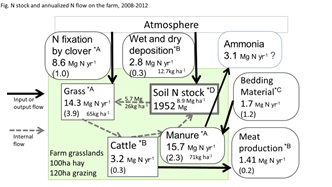
Masayuki HOJITO
Kitasato University, Japan
Title: Nitrogen Flow on an Organically Managed Beef Farm in Hokkaido, Japan
Biography
Biography: Masayuki HOJITO
Abstract
Nutrient recycling should be effective at balancing nutrient flows in Japanese animal production. This means replacing imported feed with self-produced feed. The Yakumo Experimental Farm of Kitasato University has produced commercial beef under “organic” management, without the use of agricultural chemicals or imported feed, since 2005. Using a dataset obtained from 220 ha of grassland and 250 head of cattle over the 5 years from 2008 to 2012, we estimated nitrogen (N) flow. During 2011 and 2012, we measured grass production, cattle production (selling out), soil parameters, and atmospheric deposition (from precipitation and atmospheric ammonia concentrations). To determine N fixation by clover, we compared grass + clover plots with grass-only plots. Averaged over the period, N components on the 220 ha of grassland comprised 1952 Mg soil N stock, 3.2 Mg N yr−1 in living livestock, 14.3 Mg N yr−1 uptake by grass growth (including 8.6 Mg yr−1 of N fixed by clover), 15.7 Mg N yr−1 applied in composted manure, 1.7 Mg N yr−1 in imported bedding material, 2.8 Mg N yr−1 in deposition, and 1.41 Mg N yr−1 in meat production. N in composted manure equaled about 0.8% of the huge soil N stock; N in grass production equaled about 0.7%, of which clover fixation supplied 60%; N deposition was not negligible; and N export by meat production was minor. These results show that on this organically managed farm, soil N stock increased gradually (by 8.6 Mg N yr−1 [220 ha]−1 = 39 kg N ha−1 yr−1 = 0.44% of the soil N stock) and N export was small. Our findings show that it is possible to balance N inputs with N outputs in a beef cattle enterprise without the need for feed or fertilizers


